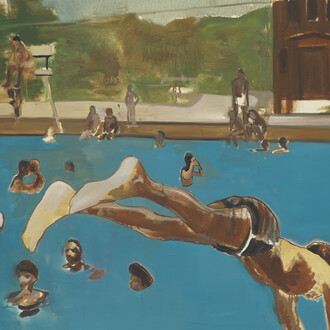For the first time, the life and work of Jamaica-born artist Mavis Pusey (1928-2019) will be fully explored in a major museum survey. Now open, ICA Philadelphia presents Mavis Pusey: Mobile images, an extensive retrospective spanning the prolific artist’s 50-year career. Featuring more than 60 works – including paintings, drawings, and prints – as well as archival materials, the exhibition explores the influences that led Pusey to develop her unique visual language through experimentation with geometric abstraction. Tracing her journey from Jamaica to New York, London, Paris, Philadelphia, and Virginia, Mobile images demonstrates the evolution of Pusey’s work throughout her life, and offers a long-overdue reexamination of her impact on American abstraction and beyond.
On view through December 7, 2025, Mavis Pusey: Mobile images is curated by Hallie Ringle, Interim Director and Daniel and Brett Sundheim Chief Curator of the ICA Philadelphia, with Kiki Teshome, Curatorial Assistant at the Studio Museum in Harlem, where it will travel in Spring 2027. The exhibition is supported by extensive research and preservation initiatives conducted in partnership with the Getty Research Institute and Getty Conservation Institute with significant support from the Mellon Foundation. Following the exhibition opening, ICA will host a two-day symposium, bringing together scholars, artists, community leaders, and the public to discuss Pusey’s legacy and the continued relevance of her work today. Dates and details will be announced at a later date.
“It has been a monumental and collaborative process to bring this project to fruition. Culminating over a decade of partnership, working initially with the artist herself and collaborating alongside Thelma Golden and the Studio Museum, the exhibition marks the first time that Pusey’s work will be on view publicly in a comprehensive manner,” remarks Ringle. “Our goal is to enable audiences to appreciate the breadth and evolution of Pusey’s work within a deeply researched framework, and for the public, scholars, and artists alike to be able to draw connections between her work and key art historical narratives and contemporary practices.”
While Pusey’s dedication to geometric abstraction earned her recognition from key curatorial voices during her lifetime, like Howardina Pindell, her work remains largely overlooked. Born and raised in Retreat, Jamaica, she created rich abstract paintings and works on paper inspired by her wide-ranging interests in fashion, print-making, and the urban environment of cities she lived in throughout her life. Pusey studied at the Art Students League under Will Barnet (1961–1965) and, later, worked at Robert Blackburn’s Printmaking Workshop (1969–1972), which was frequented by significant figures such as Emma Amos, Jacob Lawrence, Romare Bearden, and Melvin Edwards, among others. A passionate educator, she taught for some time at the Pennsylvania Academy of the Fine Arts in Philadelphia as she continued to develop her own studio work.
Pusey resisted pressures to create figurative, overtly socio-political work and remained committed to
working in abstraction, retaining a focused thematic vision of her work throughout her career. However,
discriminatory hiring practices that barred her from tenured teaching positions, and a late-in-life illness
further contributed to the fragmentation and near-loss of her artistic archive. Starting in 2015, Ringle,
who at the time served as Assistant Curator at the Studio Museum, worked closely with the artist; Thelma
Golden, Ford Foundation Director and Chief Curator of the Studio Museum; and the team at the Studio
Museum to painstakingly reassemble her body of work before her death in 2019, including the acquisition
of a large portion of Pusey’s work for the Studio Museum’s collection. With her appointment at ICA, Ringle
continued to advance her research, prompting a close collaboration between ICA and the Studio Museum
on comprehensive conservation and research initiatives to preserve the artist’s legacy.
Golden said, “Mavis Pusey was a truly pioneering artist of the abstract movement who should be rightfully recognized for her formal precision and boundless curiosity. My immense gratitude goes to Hallie Ringle for her unwavering care and research throughout this process and to the entire team at ICA Philadelphia and the Studio Museum, especially Kiki Teshome, for their dedication and attention over the course of this exhibition’s planning.”
Unfolding across ICA’s first and second floors, Mavis Pusey: Mobile images is organized in thematic sections that explore important motifs in her work, including the body, music, and demolition/construction. The exhibition will debut seven newly discovered paintings, on view for the first time alongside key works moving through each period of Pusey’s creative trajectory. Although some of Pusey’s works are over 50 years old, the themes addressed connect deeply to contemporary life. Her “Broken Construction” series (1960s–1990s) explores ideas of destruction and renewal as a metaphor for societal change. Her compositions, which show bricks and boards falling to the ground, are not dystopian realities but rather hopeful imaginings of the future. Another highlight are Pusey’s works created in reaction to the U.S. Civil Rights Movement and student protests in Paris during the 1960s. After witnessing the student protests in Paris, Pusey created several prints inspired by the movement, including Paris, Mars - Juin (1968) which shows the city in flames. Eric (1968), named after a friend, was inspired by an encounter she had with the French police: the periphery of the print is minimalist in form and grows increasingly chaotic towards the center, representing the emotional turmoil Eric felt under his cool demeanor. These and other works are contextualized by the inclusion of photographs, notes, and ephemera from Pusey’s lifetime, which offer historical and personal insight into the artist’s boundary-pushing body of work.
















